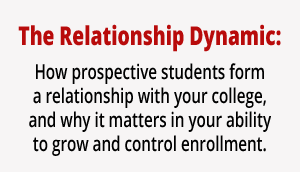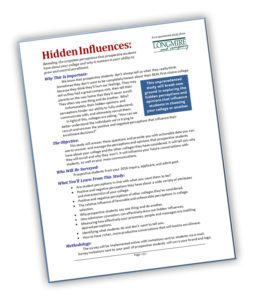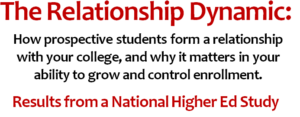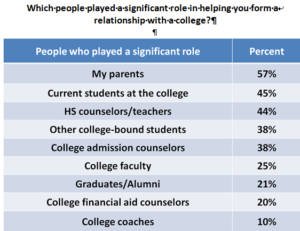Right this minute, all over the country, college-bound students are in the throes of making what is most likely THE biggest decision they have ever made: “Which college is right for me? Will the college accept me? Can I afford it?” Their parents are offering guidance and counsel because they know this is a crucial decision. Certainly, they too have a hugely vested interest in being certain that the final decision is the “right” one. Let’s face it: For nearly every student and their parent this is a period of high-anxiety .
.
No college would want to do anything that would ADD angst to an inherently stressful process, right? No college would do so intentionally but as an industry we do it all the time.
Through our pre-enrollment research, we communicate with hundreds of thousands of prospective students and parents every year and they have been very specific about the things colleges do that add stress to the selection process. Here are the 6 stress-inducing actions most often cited about the college admissions industry:
- That we communicate poorly
- That we’re slow to offer or reject admission
- That we have burdensome processes
- That admissions people are not responsive
- We are poorly organized, and,
- In some cases, they believe we’re being DISHONEST
Are you ready for some good news? Since these things happen more than you can imagine it gives you an opportunity to differentiate your college or university by doing the opposite. You can differentiate your institution by RELIEVING rather than ADDING stress to the college selection process.
Here’s how.
Students and parents have told us what you can do to help. Here are 6 stress-relieving actions:
- Communicate often and artfully. Students want information that’s relevant to THEM.
- Provide helpful advice and counsel throughout the college shopping process.
- BE RESPONSIVE. Return calls and emails promptly.
- Make decisions promptly.
- Treat each prospective student as you would expect and hope to be treated.
- Above all, show a sincere interest in the student.
These may seem obvious but it’s amazing how many colleges fail to practice these proven behaviors that will serve a prospective student and parent well. Every student has a unique combination of needs, preferences, perceptions and motivations. Identifying and dealing with all of them enables the college to have a deeper and stronger relationship with the prospective student. Uncovering them requires that the college focus on the student rather than the institution.
There are communication techniques your staff can learn that will help them feel confident about reaching out to prospective students to ask the right questions. This is one of the core techniques we teach in the Interactive Counselor Training Workshops we hold on college campuses throughout the country.
Longmire and Company’s on-campus Interactive Training Workshops improve the performance of counselors and staff in areas such as effective communication with students and parents, applying creative entrepreneurship to their jobs, validating past and planned actions against outcomes, and discovering and leveraging the motivations of students (and themselves).
The end result is improved service to prospective students and families, measurable increases in yield, increased counselor and staff job satisfaction, enhanced teamwork, and innovations in work process within the department.
We help colleges with their recruiting efforts every day. If we can help you please call or shoot me an email. Continue the conversation on Twitter @LongmireCo. For more information about Longmire and Company and the tools we have to offer, click here. Be sure to subscribe to Versions of Conversion today so you don’t miss any of this highly-valuable information.
 Rick Montgomery is as an Enrollment Strategist at Longmire and Company. With over 20 years in higher education marketing, he brings an innovative and dynamic approach to helping colleges and universities meet their enrollment goals. Rick can be reached at 913/492.1265 x.708 or via email at rmontgomery@longmire-co.com.
Rick Montgomery is as an Enrollment Strategist at Longmire and Company. With over 20 years in higher education marketing, he brings an innovative and dynamic approach to helping colleges and universities meet their enrollment goals. Rick can be reached at 913/492.1265 x.708 or via email at rmontgomery@longmire-co.com.
 Conference. NACAC’16 drew thousands of participants and I suspect that most returned home feeling like our team; newly energized and proud to be part of the profession of college admissions.
Conference. NACAC’16 drew thousands of participants and I suspect that most returned home feeling like our team; newly energized and proud to be part of the profession of college admissions.




